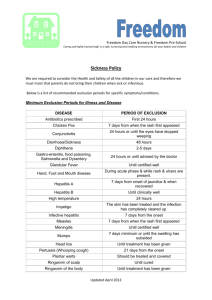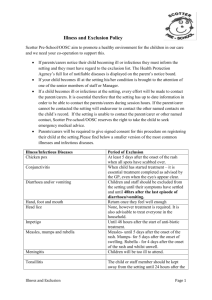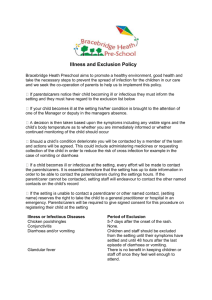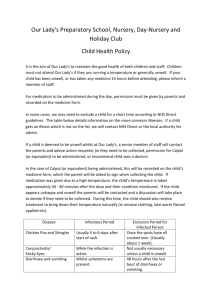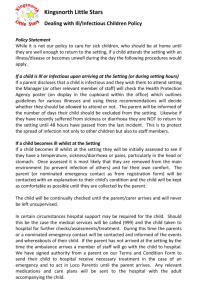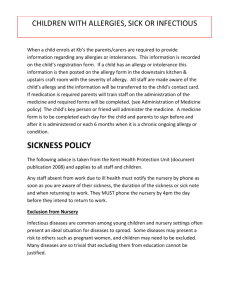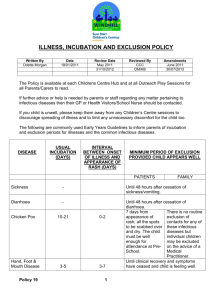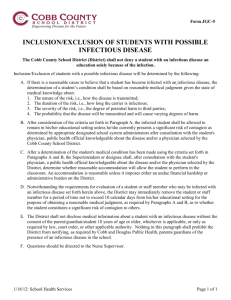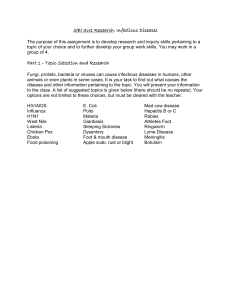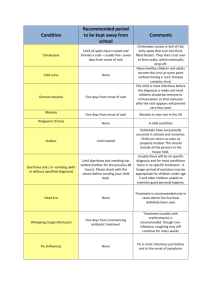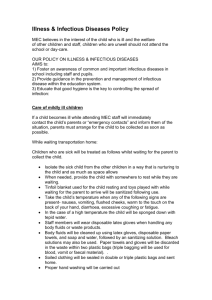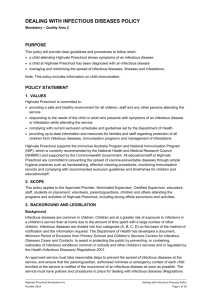illness - Scartho Nursery School
advertisement
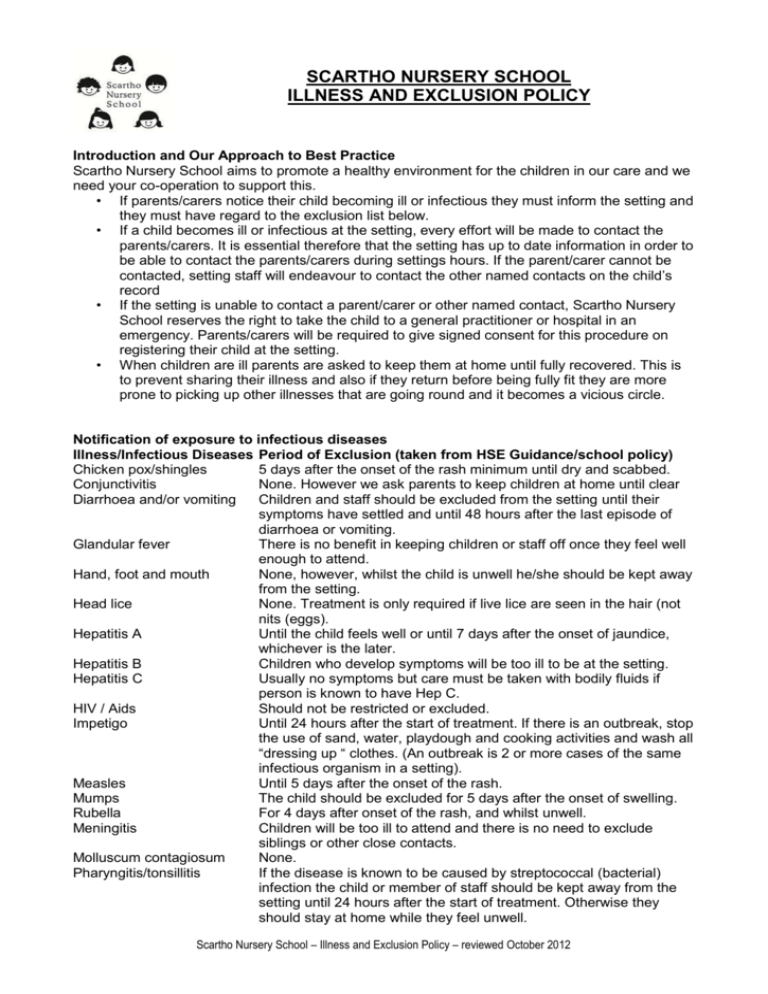
SCARTHO NURSERY SCHOOL ILLNESS AND EXCLUSION POLICY Introduction and Our Approach to Best Practice Scartho Nursery School aims to promote a healthy environment for the children in our care and we need your co-operation to support this. • If parents/carers notice their child becoming ill or infectious they must inform the setting and they must have regard to the exclusion list below. • If a child becomes ill or infectious at the setting, every effort will be made to contact the parents/carers. It is essential therefore that the setting has up to date information in order to be able to contact the parents/carers during settings hours. If the parent/carer cannot be contacted, setting staff will endeavour to contact the other named contacts on the child’s record • If the setting is unable to contact a parent/carer or other named contact, Scartho Nursery School reserves the right to take the child to a general practitioner or hospital in an emergency. Parents/carers will be required to give signed consent for this procedure on registering their child at the setting. • When children are ill parents are asked to keep them at home until fully recovered. This is to prevent sharing their illness and also if they return before being fully fit they are more prone to picking up other illnesses that are going round and it becomes a vicious circle. Notification of exposure to infectious diseases Illness/Infectious Diseases Period of Exclusion (taken from HSE Guidance/school policy) Chicken pox/shingles 5 days after the onset of the rash minimum until dry and scabbed. Conjunctivitis None. However we ask parents to keep children at home until clear Diarrhoea and/or vomiting Children and staff should be excluded from the setting until their symptoms have settled and until 48 hours after the last episode of diarrhoea or vomiting. Glandular fever There is no benefit in keeping children or staff off once they feel well enough to attend. Hand, foot and mouth None, however, whilst the child is unwell he/she should be kept away from the setting. Head lice None. Treatment is only required if live lice are seen in the hair (not nits (eggs). Hepatitis A Until the child feels well or until 7 days after the onset of jaundice, whichever is the later. Hepatitis B Children who develop symptoms will be too ill to be at the setting. Hepatitis C Usually no symptoms but care must be taken with bodily fluids if person is known to have Hep C. HIV / Aids Should not be restricted or excluded. Impetigo Until 24 hours after the start of treatment. If there is an outbreak, stop the use of sand, water, playdough and cooking activities and wash all “dressing up “ clothes. (An outbreak is 2 or more cases of the same infectious organism in a setting). Measles Until 5 days after the onset of the rash. Mumps The child should be excluded for 5 days after the onset of swelling. Rubella For 4 days after onset of the rash, and whilst unwell. Meningitis Children will be too ill to attend and there is no need to exclude siblings or other close contacts. Molluscum contagiosum None. Pharyngitis/tonsillitis If the disease is known to be caused by streptococcal (bacterial) infection the child or member of staff should be kept away from the setting until 24 hours after the start of treatment. Otherwise they should stay at home while they feel unwell. Scartho Nursery School – Illness and Exclusion Policy – reviewed October 2012 Rashes A child who is unwell and has a rash should visit their GP to establish the reason for it. Ringworm (Tinea) Children need not be excluded but spread can be prevented by good personal hygiene, regular hand washing and use of separate towels and toilet articles. Parents should be encouraged to seek treatment. Scarlet fever / Scarletina Once a patient has been on antibiotic treatment for 24 hours they can return, provided they feel well enough. Slapped cheek syndrome An affected child need not be excluded because they are no longer infectious by the time the rash occurs. Scabies Not necessary, but treatment should be commenced. Typhoid (enteric fever) Yes, an infected child is likely to be very ill and whilst infectious unable to attend the setting. Tuberculosis (TB) “Open” cases- until 2 weeks after treatment started. “Open” cases of drug resistant TB when the hospital physician advises. (“open” is determined by sputum samples). Verrucae Not necessary. Whooping cough (Pertussis) An affected child and unvaccinated contacts under 7 years should be excluded until they have had 5 days of antibiotics. Worms Not necessary. If a child contracts any of the above infectious diseases, other parents will be informed by text and/or information on the notice board. If we have reason to believe that any child is suffering from a notifiable disease identified as such in the Public Health (Infection Diseases) Regulations 2010, we will inform the local Health Protection Agency and SERCO. We will act on any advice given by the Health Protection Agency and inform SERCO of any action taken. The Health Protection Agency’s list of notifiable diseases can be found at www.hpa.org.uk is displayed in our office. Further guidance on infection control in schools and childcare settings can also be found at www.hpa.org.uk The Yorkshire and Humber Health Protection Team can be contacted on Tel: 01904 468900 Scartho Nursery School – Illness and Exclusion Policy – reviewed October 2012
